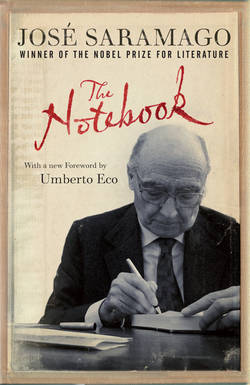Читать книгу The Notebook - José Saramago - Страница 29
На сайте Литреса книга снята с продажи.
October 13: Eduardo Lourenço
ОглавлениеI have stubbornly remained in debt to Eduardo Lourenço since 1991—for exactly seventeen years. It is a rather unique debt, because although it would be natural for him, as the creditor, never to have forgotten it, it is rather less common that I, the debtor, contrary to the nature of my kind, have never denied it. However, if it is indeed true that I have never pretended to be oblivious to my debt, it should also be said that he has never allowed me to be deceived by his tactical silences on the subject, which he intermittently breaks, saying, “So what about those photographs?” My response is always the same: “Oh hell, I’ve been very busy with work, but the worst thing is I’ve still not been able to send them off to get the copies made.” And he, every bit as consistent as I am, “There are six of them: you keep three and give me back the rest.” “No, never, that would be absurd, you should have them all,” I always reply, hypocritically magnanimous. Now, the time has really come for me to explain what these photos are. We were—he and I—in Brussels, at Europalia, and were wandering about like any other curious people from hall to hall, commenting on the beauties and opulence displayed, and Augusto Cabrita was with us, camera at the ready, in search of the immortal moment. What he was expecting to find at the moment when Eduardo Lourenço and I stood with our backs to a baroque tapestry of some historical or mythical scene, I don’t really know. “Right there,” commanded Cabrita, with that fierce air that photographers have in what I imagine they consider critical situations. To this day I have no idea what little demon made me not take the solemnity of the moment seriously. I began by straightening Eduardo’s tie, then invented something about his glasses not being on straight and devoted myself to putting them in their proper place, where in fact they had been all along. We started laughing like two little boys, he and I, while Augusto Cabrita with one shot after another took advantage of the occasion that had been offered him on a platter. That is the story of the photographs. A few days later, Augusto Cabrita, who died two years ago, sent me the pictures, thinking no doubt that they would be in good hands. They were indeed good hands, or not altogether bad hands, but, as I have explained, not very effective ones.
Some time after that I came to write the novel All the Names, which, as I thought at the time and continue to believe today, could have had no one better than Eduardo to present it. I made this known to him, and he, good chap that he is, agreed at once. The day came, the biggest room in the Altis Hotel was bursting at the seams, and no sign or word of Eduardo Lourenço. You could breathe the concern in the heavy air—something must have happened. On top of this, the great essayist has a reputation for haplessness, and he might have got the wrong hotel. So hapless, so hapless indeed, that when he finally did arrive he announced, in the calmest voice in the world, that he had lost his speech. There was a general “Ah” of consternation, in which I did not join. For a terrible suspicion had assailed my soul: that Eduardo Lourenço had decided to take advantage of the occasion to avenge himself for the episode of the photographs. I was wrong. With or without his notes, the man was as brilliant as ever. He started off on some ideas, weighed them up with the misleading air of someone who was thinking about something else, left a few of them to one side for a second examination, arranged others on an invisible tray, allowing them to develop the necessary connections between themselves and other minor ideas that in fact turned out to be more valuable than had first appeared. The final result, if I might be permitted the metaphor, was a nugget of solid gold.
My debt had increased, had expanded wider than the hole in the ozone layer. The years went by. Until—and there is always an “until” to set us straight at last, as though time, after a lot of waiting, has lost patience. In this case it was my recent reading of an essay by Eduardo Lourenço, ‘Do immemorial ou a dança do tempo’ [“On the Immemorial or the Dance of Time”], in the journal Portuguese Literary and Cultural Studies 7 from the University of Massachusetts at Dartmouth. It would be insulting to summarize this extraordinary piece. I will limit myself to assuring you that the famous copies are now finally in my possession and that Eduardo will receive them in a few days. With the greatest friendship and deepest admiration.
